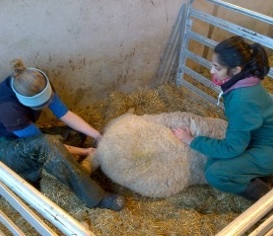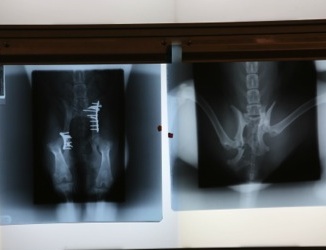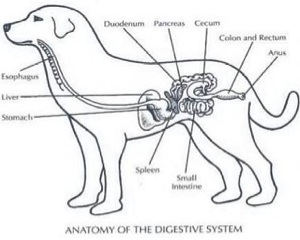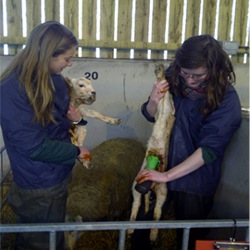In the 4th year, students start to apply their scientific knowledge from the preclinical years to clinical scenarios, and clinical practice.
A list of lecture courses for the 4th year is given below, with some examples of the material covered within them, and an indication of how the material relates to other parts of the clinical curriculum. Courses are listed by term. A full list of lectures is given on the department’s web page (Raven access only).
Lectures are complemented by a series of practical classes, called ‘rotations’, in areas such as consultation skills, farm animal clinical studies and visits to the RSPCA Clinic in Cambridge. During the 4th year, students also help with lambing the flock at the University Farm in January and February.
Lambing was a fun experience! The staff were great teachers - enthusiastic and always encouraging us to get hands-on experience.
Sam 2015
Assessment: Students complete a series of multiple-choice examinations, over 5 terms of study (i.e. over 3 terms of 4th year and 2 terms of 5th year). These assessments form the Final Vet MB Part I examination, which students must pass in order to enter the Final Vet MB Part II examination, which is taken in the third term of the 5th year.
Michaelmas Term (September to December)
Principles of Anaesthesia
This course complements and extends preclinical teaching in physiology, pharmacology, pathology and biochemistry and relates it to anaesthesia of domestic animals.
Principles of Infectious Diseases
This course aims to develop the students’ understanding of the microbiological diseases that affect domesticated species. This will act as core knowledge on which to base pathogenesis, pathology and clinical manifestations of diseases discussed in the  systems courses and then species courses.
systems courses and then species courses.
Clinical Pathology
This course enables students to use their previously obtained knowledge of basic physiological and pathological processes to understand the scientific basis of clinical pathology, and gives students the necessary practical tools and knowledge to use clinical pathology effectively to help in the diagnosis and monitoring of large and small animal cases in practice. The course continues in the 5th year.
Clinical Pharmacology
The course covers drug treatment in clinical practice, the main categories of analgesic and anti-inflammatory agents in veterinary use. The course will also introduce the clinical properties of the major categories of chemotherapeutic drugs in veterinary use.
Principles of Oncology
I really enjoyed the practical sessions, where we looked at pathology and clinical material at the same time. It helped consolidate the material I had learnt in the lectures
Chris 2015
The Principles of Oncology course aims to provide a core understanding of neoplasia in animal species using a practical- and veterinary-oriented approach.
Radiology and Radiography
The radiography course is designed to teach the student a safe practical approach to veterinary radiography. The principles of radiological interpretation follow on from the ability to produce a diagnostic x-ray. This is core material, but new imaging techniques are discussed and a basic course in ultrasound is given.
Principles of Surgery
This course introduces students to the basic principles of surgery and serves as the forerunner for subsequent regional surgery lectures (e.g. ophthalmology, orthopaedics, soft tissue surgery).
Lent Term (January to March)
Alimentary System
This course builds on the basic principles of microbiology and parasitology taught in the preclinical course and in the Principles of Infectious Diseases course which is taught in the first term of 4th year.
Material is further developed in the species courses in 5th year.
Dentistry
The course aims to cover the essential practical and theoretical facts required to provide basic dental care in small animal practice, with a focus on first-opinion practice, and continues into 5th year.
Evidence-Based Medicine
The aim of this course is to provide students with a framework of understanding of clinical epidemiology that they can use to apply the principles of evidence based medicine (EBM) in the practice of veterinary medicine.
Easter Term (April to June)
Exotic, Wildlife & Conservation Medicine
This course aims to provide a fundamental level of knowledge and skills required for veterinary involvement in the management of health and welfare of exotic, wild and zoo animals.
Ophthalmology
This course aims to provide students with a basic understanding of ocular diseases based on clinical presentations.
Orthopaedic Pathology
The Orthopaedic Pathology course aims to enable the student to understand the pathobiological principles underlying the growth of bone and the changes seen both grossly and histologically in common bone and joint disease states.
Poultry Husbandry and Diseases
This course provides students with an insight into the husbandry and disease control systems used in poultry and game bird production.
Respiratory System
The course aims to lay the foundations for the discussion of respiratory diseases in species medicine courses, by covering areas such as defence mechanisms of the respiratory tract and basic concepts and examples of toxicological diseases of the lung.
Courses which run over multiple terms
Animal Breeding (Michaelmas, Lent and Easter)
I throughly enjoyed the Animal Breeding course and the lectures were all of an extremely high standard
Katy 2015
The course will focus on the clinical and practical aspects of efficient reproductive husbandry and breeding in cattle, sheep and goats, horses, dogs and cats, pigs, common exotic species. It will provide a thorough knowledge of fertility, pregnancy, parturition and newborn care.
Cattle Medicine (Michaelmas, Lent and Easter)
The content of this course complements and extends instruction provided in other courses related to health, diseases and productivity in cattle and is designed to provide the necessary theoretical framework to support the competent practise of cattle medicine.
Integrated Animal Management (Michaelmas and Lent)
This course aims to promote an in-depth understanding of the scientific principles underlying the management of animals within the framework of providing for nutritional, housing, behaviour and welfare requirements.
Small Ruminant Husbandry and Medicine (Lent and Easter)
This course is designed to build on the background of knowledge on the principles of husbandry, nutrition, etc., and  pathogenesis, pathology, epidemiology and control of parasitological, microbiological, metabolic and other diseases.
pathogenesis, pathology, epidemiology and control of parasitological, microbiological, metabolic and other diseases.
Veterinary Public Health (Lent and Easter)
The Veterinary Public Health (VPH) course aims to provide students with veterinary skills, knowledge, and understanding so that they can contribute to the protection and improvement of human health
